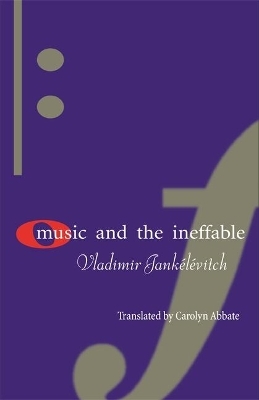
Music and the Ineffable
Seiten
2003
Princeton University Press (Verlag)
978-0-691-09047-4 (ISBN)
Princeton University Press (Verlag)
978-0-691-09047-4 (ISBN)
Deals with classical issues in the philosophy of music, including metaphysics and ontology. This book argues that music is not a hieroglyph, nor a language or sign system. It argues that music is 'ineffable', because it cannot be pinned down, and has a capacity to engender limitless resonance in several domains.
Vladimir Jankelevitch left behind a remarkable ?uvre steeped as much in philosophy as in music. His writings on moral quandaries reflect a lifelong devotion to music and performance, and, as a counterpoint, he wrote on music aesthetics and on modernist composers such as Faure, Debussy, and Ravel. Music and the Ineffable brings together these two threads, the philosophical and the musical, as an extraordinary quintessence of his thought. Jankelevitch deals with classical issues in the philosophy of music, including metaphysics and ontology. These are a point of departure for a sustained examination and dismantling of the idea of musical hermeneutics in its conventional sense. Music, Jankelevitch argues, is not a hieroglyph, not a language or sign system; nor does it express emotions, depict landscapes or cultures, or narrate. On the other hand, music cannot be imprisoned within the icy, morbid notion of pure structure or autonomous discourse. Yet if musical works are not a cipher awaiting the decoder, music is nonetheless entwined with human experience, and with the physical, material reality of music in performance.
Music is "ineffable," as Jankelevitch puts it, because it cannot be pinned down, and has a capacity to engender limitless resonance in several domains. Jankelevitch's singular work on music was central to such figures as Roland Barthes and Catherine Clement, and the complex textures and rhythms of his lyrical prose sound a unique note, until recently seldom heard outside the francophone world.
Vladimir Jankelevitch left behind a remarkable ?uvre steeped as much in philosophy as in music. His writings on moral quandaries reflect a lifelong devotion to music and performance, and, as a counterpoint, he wrote on music aesthetics and on modernist composers such as Faure, Debussy, and Ravel. Music and the Ineffable brings together these two threads, the philosophical and the musical, as an extraordinary quintessence of his thought. Jankelevitch deals with classical issues in the philosophy of music, including metaphysics and ontology. These are a point of departure for a sustained examination and dismantling of the idea of musical hermeneutics in its conventional sense. Music, Jankelevitch argues, is not a hieroglyph, not a language or sign system; nor does it express emotions, depict landscapes or cultures, or narrate. On the other hand, music cannot be imprisoned within the icy, morbid notion of pure structure or autonomous discourse. Yet if musical works are not a cipher awaiting the decoder, music is nonetheless entwined with human experience, and with the physical, material reality of music in performance.
Music is "ineffable," as Jankelevitch puts it, because it cannot be pinned down, and has a capacity to engender limitless resonance in several domains. Jankelevitch's singular work on music was central to such figures as Roland Barthes and Catherine Clement, and the complex textures and rhythms of his lyrical prose sound a unique note, until recently seldom heard outside the francophone world.
Vladimir Jankelevitch (1903-1985), a critical figure in twentieth-century French philosophy, held the Chair in Moral Philosophy at the Sorbonne from 1951 to 1978. He was the author of more than twenty books on philosophy, as well as a number of books on music. Carolyn Abbate is Professor of Music at Princeton University. She is the author of "In Search of Opera" (Princeton) and the translator of Jean-Jaques Nattiez's "Music and Discourse".
| Erscheint lt. Verlag | 28.7.2003 |
|---|---|
| Übersetzer | Carolyn Abbate |
| Zusatzinfo | 7 musical examples. |
| Verlagsort | New Jersey |
| Sprache | englisch |
| Maße | 140 x 216 mm |
| Gewicht | 340 g |
| Themenwelt | Kunst / Musik / Theater ► Musik ► Musiktheorie / Musiklehre |
| Geisteswissenschaften ► Philosophie ► Ethik | |
| ISBN-10 | 0-691-09047-5 / 0691090475 |
| ISBN-13 | 978-0-691-09047-4 / 9780691090474 |
| Zustand | Neuware |
| Haben Sie eine Frage zum Produkt? |
Mehr entdecken
aus dem Bereich
aus dem Bereich
Grundbegriffe, Harmonik, Formen, Instrumente
Buch | Softcover (2021)
Philipp Reclam (Verlag)
CHF 12,90
Jazz als Gegenkultur im westlichen Nachkriegsdeutschland
Buch | Hardcover (2024)
edition text + kritik (Verlag)
CHF 57,90


